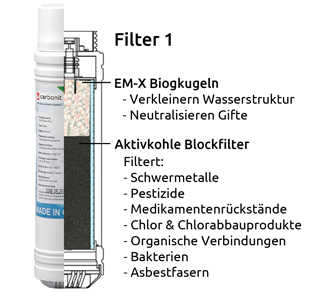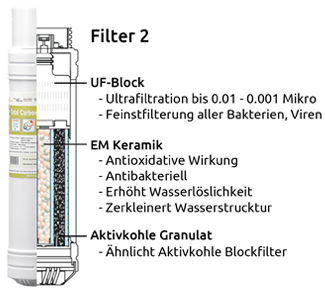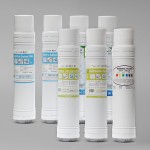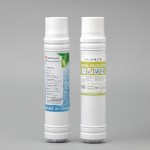Tyent filters
2 filter system (size: 28 cm long x 6.4 cm in diameter)


A combination of two filters is always required for operation in the water ionizer.
 Data sheet of the seven filter pairs for the Eco series TY and the Classic series MMP
Data sheet of the seven filter pairs for the Eco series TY and the Classic series MMP

Datasheet for the
Filter pair for the Elite series HI and the Style series UCE
For the sake of simplicity, only the respective main properties of the filters are described here. In some cases, however, these have more than one property.
First filters for the Eco series TY and the Classic series MMP
ABF carbonit®block filters remove ingredients such as heavy metals, asbestos, drug residues, bacteria and pesticides from the water without filtering out flavor-forming minerals such as calcium and magnesium. In addition, the activated carbon removes undesirable odors and flavors and neutralizes the chlorine that is often added as a disinfectant by waterworks.
ABF carbonit® filters work without chemicals and only with the help of the water pressure from your water pipe. Carbonite filters are made from the carbon-rich shell of coconuts. The shells are charred in the absence of air and refined using a unique, internationally patented process. The black powder is then baked in ovens at a high temperature and pressed as a cartridge. The filters are made in Germany by carbonit®.
ACF activated carbon block filter – Unlike conventional activated carbon filters, the ACF activated carbon filters consist of compact, space-saving activated carbon blocks in the form of hollow cylinders. The tap water to be cleaned flows under pressure to the outside of the cylinder. During the passage it is cleaned by the activated charcoal and finally discharged again as filtrate via the cavity inside the cartridge. Only non-recycled activated carbon is used.
ACF activated carbon filter – Due to its highly porous nature, activated carbon has a large “specific surface” (300-2000 m2 / g) and that is the reason for its large absorption capacity. By “absorbing” pollutants (physical or chemical adhesion of molecules to a solid surface), activated charcoal is able to remove various substances in a natural way. The activated charcoal binds microorganisms that can no longer get out of the filter unit even under mechanical stress such as water (also known as the “chromatography effect”, i.e. the release of previously absorbed pollutants back into the water). This ACF activated carbon filter is “NSF-42” approved and not silver-coated. Only non-recycled activated charcoal is used.
Second filter for the Eco series TY and the Classic series MMP
In the case of ultrafiltration with a UF membrane filter, the water is pressed through small plastic tubes with the pressure in the house. The fine pores, 0.01-0.1 µm, serve as a filter. For comparison: a human hair has a diameter of approx. 50 µm – this is 5000 times that. 0.1 µm corresponds to 0.0001 mm. The great advantage of ultrafiltration compared to conventional filter methods is that the filtered water is sterile. The pores of the UF membrane are so tiny that bacteria and even viruses are too large to pass through the UF membrane. By bundling many such filter tubes into a filter module, the necessary area is created to allow sufficient water flow for a water ionizer.
All EM ceramics are fermented with the help of microorganisms (lactobacillus, yeast and photosynthetic bacteria – and a number of high-quality organic substances) in a special manufacturing process for at least 6 months and then formed into a plastic mass with valuable clay and at a temperature of up to 1300 Burned ° C. The clay contains organic material that comes from plants and formed enzymes together with primeval microbes in the process of change that took place millions of years ago. With the mixture of effective microorganisms and high-quality clays, a combination has been achieved that is particularly effective. This ceramic gives the water a higher emulsification and dispersibility and an overall better solubility with other substances. Since it is an anionic ceramic, the water becomes slightly alkaline. It neutralizes oxidized (acidic) components in water and removes bad taste and odor from water.
Mineral filter (alkali filter) – Sometimes waterworks supply water that is very poor in minerals, e.g. B. Such water often comes from dams or reservoirs. This water is extremely soft and has a very low degree of hardness. In order to ensure sufficient mineralization of the water for satisfactory ionization in the electrolysis chamber of the water ionizer, we recommend the use of this mineral filter (alkali filter). The alkali filter enriches the water with minerals during the flow and thus ensures a re-mineralization of the tap water.
First filter for the Elite series HI and the Style series UCE
ACF activated carbon filter – Due to its highly porous nature, activated carbon has a large “specific surface” (300-2000 m2 / g) and that is the reason for its large absorption capacity. By “absorbing” pollutants (physical or chemical adhesion of molecules to a solid surface), activated charcoal is able to remove various substances in a natural way. The activated charcoal binds microorganisms that can no longer get out of the filter unit even under mechanical stress such as water (also known as the “chromatography effect”, i.e. the release of previously absorbed pollutants back into the water). This ACF activated carbon filter is “NSF-42” approved and not silver-coated. Only non-recycled activated carbon is used.
All EM ceramics are fermented with the help of microorganisms (lactobacillus, yeast and photosynthetic bacteria – and a number of high-quality organic substances) in a special manufacturing process for at least 6 months and then formed into a plastic mass with valuable clay and at a temperature of up to 1300 Burned ° C. The clay contains organic material that comes from plants and formed enzymes together with primeval microbes in the process of change that took place millions of years ago. With the mixture of effective microorganisms and high-quality clays, a combination has been achieved that is particularly effective. This ceramic gives the water a higher emulsification and dispersibility and an overall better solubility with other substances. Since it is an anionic ceramic, the water becomes slightly alkaline. It neutralizes oxidized (acidic) components in water and removes bad taste and odor from water.
Second filter for the Elite series HI and the Style series UCE
ACF activated carbon filter – Due to its highly porous nature, activated carbon has a large “specific surface” (300-2000 m2 / g) and that is the reason for its large absorption capacity. By “absorbing” pollutants (physical or chemical adhesion of molecules to a solid surface), activated charcoal is able to remove various substances in a natural way. The activated charcoal binds microorganisms that can no longer get out of the filter unit even under mechanical stress such as water (also known as the “chromatography effect”, i.e. the release of previously absorbed pollutants back into the water). This ACF activated carbon filter is “NSF-42” approved and not silver-coated. Only non-recycled activated carbon is used.
In the case of ultrafiltration with a UF membrane filter, the water is pressed through small plastic tubes with the pressure in the house. The fine pores, 0.01-0.1 µm, serve as a filter. For comparison: a human hair has a diameter of approx. 50 µm – this is 5000 times that. 0.1 µm corresponds to 0.0001 mm. The great advantage of ultrafiltration compared to conventional filter methods is that the filtered water is sterile. The pores of the UF membrane are so tiny that bacteria and even viruses are too large to pass through the UF membrane. By bundling many such filter tubes into a filter module, the necessary area is created to allow sufficient water flow for a water ionizer.



